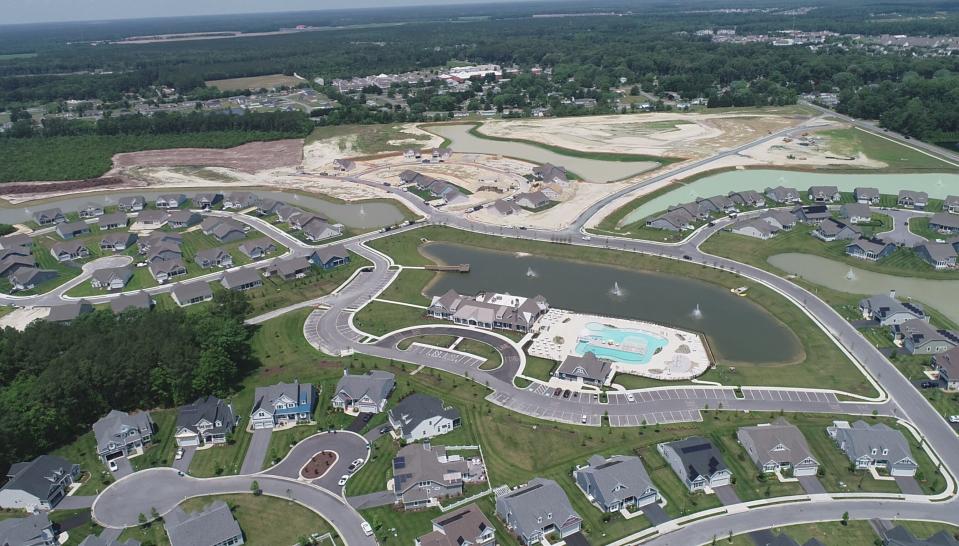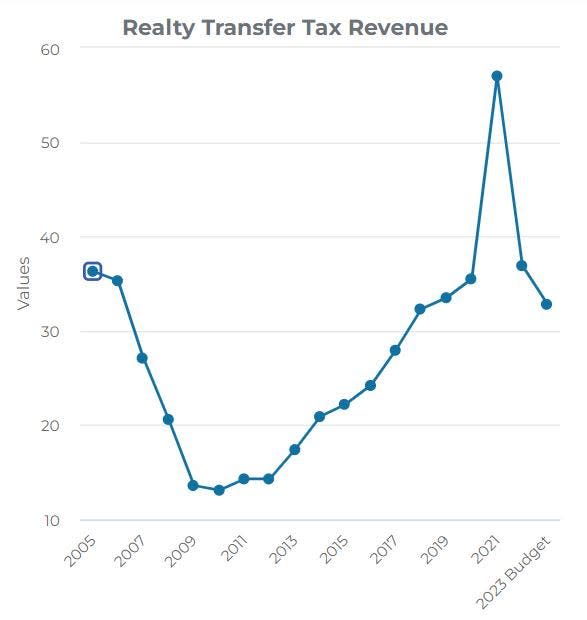What to know about Sussex County budget. First responders, sewer infrastructure and more
The housing boom that led to record-breaking tax revenue for Sussex County is slowing down.
The pandemic supercharged the appeal of the Delaware beaches in 2021, leading the county to issue 14,501 building permits and collect beaucoup realty transfer taxes. Since then, building permit issuances have decreased, with 13,200 projected to be issued in 2023.
Still, that's higher than pre-pandemic years, and the people who moved into all those new homes are paying taxes, resulting in a better financial baseline for Delaware's southernmost county.
Sussex County's proposed fiscal year 2024 budget of $278.5 million is down about $15 million from last year, but the county is still reaping benefits from the boom, allowing more spending for first responders, sewer infrastructure and county staffing, among other things.

There's no property tax increase proposed this year (that could happen next year following reassessment), but some fees will likely go up incrementally, such as a proposed $10 increase for annual sewer fees.
County Administrator Todd Lawson said Sussex is navigating “an uncertain financial environment as the economy continues to decelerate," however, conservative budgeting, as well as sewer and water customers, are keeping the county in good financial standing.
“The real concern remains continual inflation and increasing interest rates while many economists predict a recession is more likely than not in the coming twelve months,” Lawson said.
County budgeting is measured in fiscal years, which start July 1 and end June 30.
More: Sleek new Rehoboth Beach seafood restaurant is in building dating back to 1890
The 2024 budget must be adopted by June 30. Following a June 20 public hearing, the county council is expected to adopt the budget at their June 27 meeting.
Here's what it predicts and proposes.
Realty transfer tax revenue down
Realty transfer taxes are the county’s 1.5% tax on the transfer of property, such as in a sale. They’re important because they pay for “some of the county’s most critical services,” Lawson said, including first responders.
Building permits hit a record high in 2021. Building permits also includes decks, pools, and other accessories. RTT hit a high in 2022. I believe the lag between the two is houses being built first and the transfer revenue happening second. 51,32
The tax is also one of the county’s most volatile sources of revenue. It hit a record high of $63 million in 2022. Prior to that, the record was $36 million, achieved in 2005. Realty transfer tax revenue is expected to drop to $51 million million this year and down to $32 million in fiscal year 2024.

“As we look to the future, this is a concern the county will need to address,” Lawson said. “Should (realty transfer tax revenues) drop below anticipated levels, it is likely at some point in the future, the county will need to seek additional revenue from the taxpayers.”
Though less property is changing hands, other tax revenues are up, with nearly $53 million in total tax revenue expected for fiscal year 2024. Overall, both revenues and expenses are trending upward, according to the proposed budget.
Emergency operations
The Sussex County Emergency Operations Center averages 314 911 calls a day, according to the proposed budget, and incidents dispatched from the center increased over 5% from last year. The department is budgeted about $5.7 million for fiscal year 2024, mainly for dispatcher salaries.

Responses by the county's EMS have increased over 73% in the last decade, according to the proposed budget. They're allocated about $21 million in the coming fiscal year, to include:
about $500,000 for six new EMS vehicles,
$400,000 for service expansions in the Milton and Roxana areas,
$2 million for the design, planning and construction of paramedic stations in the Dewey Beach, Lincoln, Millsboro and Milton areas.
Grant-in-aid
Sussex County’s grant spending is up over $2 million from last year, largely due to a $1.5 million grant to the state to help fund a splash pad at Trap Pond State Park in Laurel. This year's proposed grant-in-aid totals about $24.3 million.
Public safety is the largest grant-in-aid category. Planned this year:
$5.6 million for fire and ambulance companies
$4.1 million for 23 supplemental Delaware State Police troopers
$800,000 for local law enforcement
$15,000 for lifeguards.
Grant-in-aid and other county funds are also proposed to provide $2.9 million for public libraries (and another $400,000 for a new book mobile), as well as $7.4 million for open space.
More: Ready to beach? Here are 5 new spots for nightlife & bites at Delaware beaches this summer
Sewer and water
Sussex County owns and operates water districts in Dewey Beach and Ellendale, with an expansion happening in Millsboro’s Winding Creek. The county’s sewer district is much larger, with over 80,000 customers countywide.
In fiscal year 2022, Sussex made about $1.3 million in water charges and $28.5 million in sewer charges. The county spends a lot of money on the sewer system, too, which includes four wastewater treatment plants and over 500 pump stations. The fiscal year 2024 budget proposes $66.1 million for wastewater infrastructure.
Between 2023 and 2027, over $173 million is planned for sewer and water projects, all of which will be paid for by sewer and water revenue.
Other expenses
Lawson oversees over 560 employees, the most in the county’s history. At $56.6 million, they are the county’s greatest operational expense, but most of the newer positions are public safety-related and directly tied to the increase in population.
Some Sussex residents may pay more in property taxes next year, thanks to a court-ordered property tax reassessment. This year’s proposed budget includes $3.4 million for the continuing reassessment work.
Finally, Sussex County owns Delaware Coastal Airport and Business Park in Georgetown. It's budgeted a proposed $1.2 million this year.
Shannon Marvel McNaught reports on Sussex County and beyond. Reach her at smcaught@gannett.com or on Twitter @MarvelMcNaught
This article originally appeared on Delaware News Journal: Sussex budget addresses first responders, sewer infrastructure

